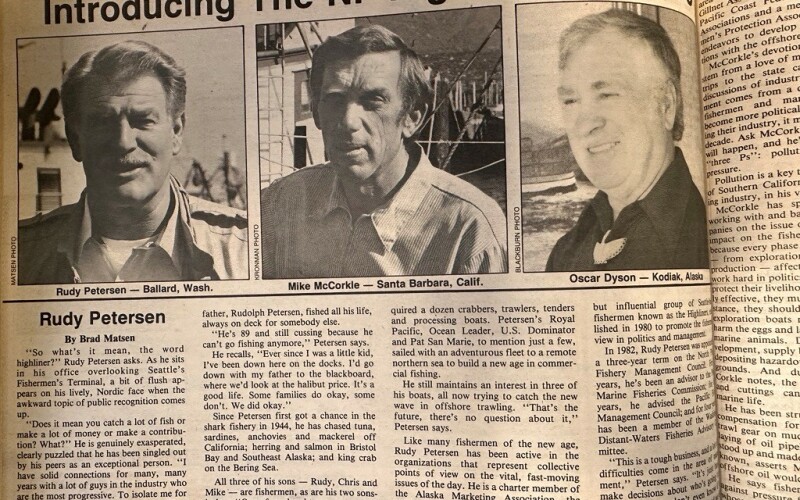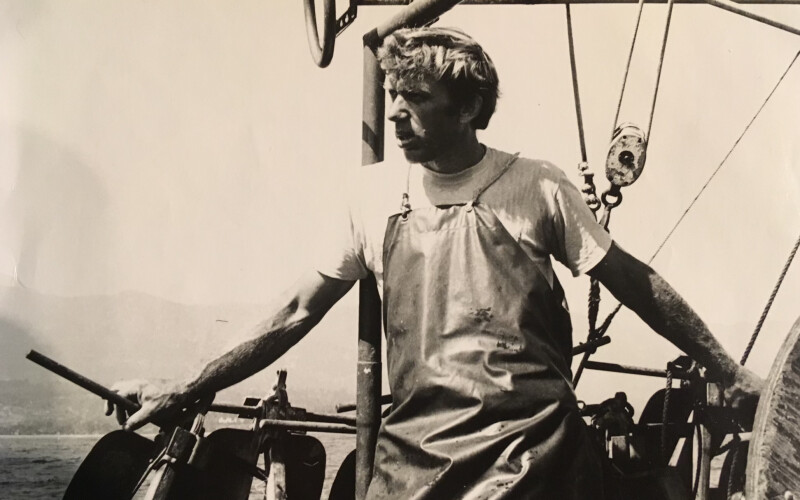The Commercial Fishermen of Santa Barbara shared the news of McCorkle’s passing on Sept. 4, 2023. The statement said, “He was one of the greatest Santa Barbara Commercial Fishermen to have ever lived, and he will be dearly missed by all that knew him.”
Mike McCorkle’s Highliner introduction from November 1985 of National Fisherman was written by Mick Kronman. This article was reprinted to remember McCorkle and his efforts within the commercial fishing industry in California.
Circa 1985
Ask any veteran commercial fisherman between San Francisco and San Diego who Mike McCorkle is, and you’ll hear about a man who has fished professionally for 30 years and possesses an encyclopedic knowledge of boats, skippers, fisheries, vessel designs, gear types, and conflicts that have affected the industry.
With his vessel, the Pieface, a 36’ plank-and-frame knuckle-stern troller he bought in 1964, McCorkle has been involved in 20 fisheries and has developed a thorough understanding of each.
For two decades, he’s been using, collecting, and storing gear: swordfish planks, gillnets, winches, net reels, trawl gear, shark longlines, traps, lampara nets, salmon gurdies, tuna feathers, rock cod hooks, bait tanks, and albacore lift poles have filled his garage and back yard at various times. To walk through the labyrinth of gear is to take a historical tour of California’s commercial fisheries- all of them.
As McCorkle will tell you, “You never know when some fish is gonna show up. Maybe it hasn’t been around for 10 or 15 years, but when it’s here, you’d better be ready.”
In addition to making a living and supporting his family solely by fishing, McCorkle has devoted hundreds of hours to the politics that affect the industry he so dearly loves. Today, he’s the Santa Barbara area’s representative to the California Gillnet Association, a voting director of the Pacific Coast Federation of Fishermen’s Associations, a member of Fishermen’s Associations, and a member of the Fishermen’s Protection Association. This group endeavors to develop good working relations with the offshore oil industry.
McCorkle’s devotion to politics does not stem from a love of meetings, paperwork, trips to the state capital, or exhaustive discussions of industry goals. His involvement comes from a deep fear that unless fishermen and marketing associations become more politically involved in managing their industry, it may die within the next decade. Ask McCorkle why he thinks that will happen, and he’ll tell you about the “three Ps”: pollution, petroleum, and pressure.
Pollution is a crucial threat to the lifeblood of Southern California’s commercial fishing industry, in his view.
McCorkle has spent years alternately working with and battling against oil companies on the issue of oil pollution and its impact on fisheries. He explains that because every phase of offshore oil activity- from exploration to development and production- affects fishermen, they must work hard in politics and fishing to protect their livelihood. And to be politically influential, they must be informed. For instance, they should be aware that seismic exploration boats may scare off fish and harm the eggs and larvae of a wide range of marine animals. During oil-field development, supply boats must be kept from depositing hazardous materials on the trawl grounds. And during production, McCorkle notes, the dumping of drill mud and cutting can ruin bottom-dwelling marine life.
He has been struggling for years to gain compensation for fishermen who’ve lost trawl gear on mud mounds created by laying of oil pipelines. If more fishermen stood up and made their needs and opinions known, asserts McCorkle, the impact of offshore oil would be less severe.
He says fishermen should also guard against pressure from protectionist groups whose emotional lobbies pose a direct threat to the fishing industry. The current situation with California sea otters is a case in point. Expansion of the sea otter’s range is accompanied by the corresponding outlawing of inshore gillnetting on California’s central coast.
“It’s a pitiful thing,” says McCorkle, “to see a group of guys whose families have been gillnetting for 75 years get put out of business overnight. To allow the continued expansion of the sea otter range is to kiss the gillnet and diving industries goodbye.”
He contends that if more fishermen would raise their voices constructively, the stewards of our marine resources could be made to listen and would start “managing the fish, not the fishermen.”








